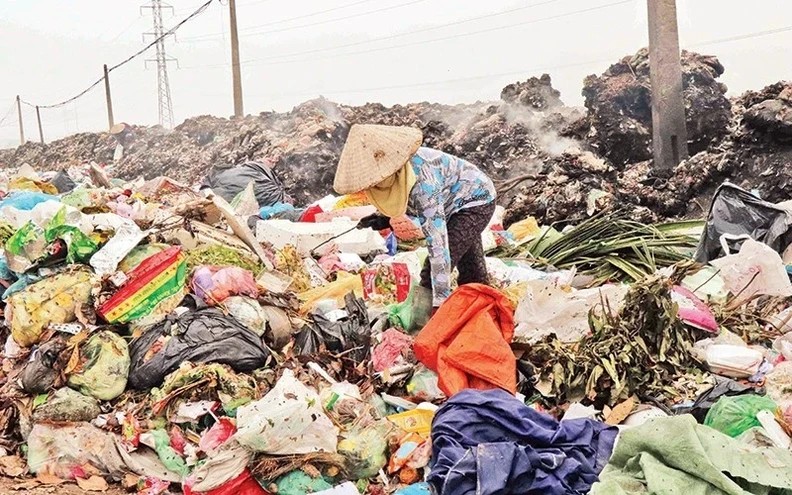Turning waste into resources for sustainable development
 |
| Photo for illustration |
From policy to action
Faced with the situation of increasing household waste, the Party and the state have issued several documents on policies and directions for resource management and environmental protection, such as:
Resolution No. 24-NQ/TW (June 13, 2013) of the 11th Party Central Committee on environmental protection.
Conclusion No. 81-KL/TW (June 4, 2024) on promoting the circular economy, developing infrastructure for waste sorting, collection, and treatment, developing the recycling industry, strengthening treatment in combination with energy recovery, and landfill limitation.
Resolution No. 81/2023/QH15 on the national master plan for the 2021-2030 period with a vision to 2050, which also outlines a direction prioritising environmental protection, including waste sorting at source, gradually minimising landfill, and transitioning to treatment facilities using modern technology.
Decision No. 611/QĐ-TTg (July 8, 2024) of the Prime Minister, approving the national environmental protection plan for the 2021-2030 period, with a vision to 2050, aiming to form a synchronised system of centralised waste treatment zones at national, regional, and provincial levels with appropriate capacity and technology.
It is evident that policies and legal regulations are quite comprehensive; the important factor now is the implementation process to connect these policies and regulations with practical reality.
Pham Minh Cuong, Deputy Head of the Waste Management Department under the Department of Environmental Pollution Control, said that the key factor for successful implementation of regulations on waste sorting and treatment is the determination of authorities at all levels and socio-political organisations to build plans. These plans should incorporate waste sorting methods appropriate to the waste characteristics of each locality, and integrate sorting methods seamlessly with waste collection, transportation, and treatment steps. Pilot schemes should be organised progressively and appropriately on a small scale before being implemented on a large-scale, especially regarding the waste collection fees based on volume and weight.
In term of communication, Truong The Khoi, Deputy Head of the Department of Natural Resources and Environment of Dong Da District (Hanoi), stated that there can be no effective solution if there is a lack of awareness in changing.
“It needs to start in schools, so pupils can learn about the environment, practise waste sorting, and understand the significance of plastic waste reduction,” Khoi shared.
Meanwhile, Le Thi Tuyet Nhung, Chairwoman of the Vietnam Fatherland Front Committee of Long Thanh My Ward (Thu Duc City, Ho Chi Minh City), said that the important thing is to create the habit of waste sorting in households. To achieve this, in the coming time, the community’s awareness-raising must be enhanced digital transformation application for communication and education of environmental protection and waste sorting.
Upgrading waste collection systems and technology
Waste treatment technology applications to generate power and modern, environmentally friendly recycling methods to replace old and outdated ones is a key goal in addressing the waste treatment issue. Therefore, localities need to research and select suitable technologies. The state should also assess and build pilot models for energy recovery from waste in order to identify suitable models for replication across the country. The development of waste-to-energy plants not only brings economic benefits by processing landfilled waste but also addresses environmental issues.
 |
| Photo for illustration (Source: NDO) |
One of units effectively applies waste treatment technology is Bac Ninh EU-CONCH VENTURE New Energy Co., Ltd., which is operating a waste-to-energy plant in Luong Tai District, Bac Ninh Province.
Sharing from the practical experience of waste management, a representative of the company said that the plant is using advanced technology of Japan. It is highly effective with the characteristics of domestic waste in Vietnam, which has high moisture and contains much soil and sand. The waste incineration technology in furnaces at 1,000 degrees Celsius efficiently decomposes harmful substances. The exhaust gases are filtered through a baghouse reaction tower, and leachate is treated and reused within the plant, making it safe and environmentally friendly.
Professor Dr Trinh Van Tuyen, former Director of the Institute of Environmental Technology, believes that the competent authorities need to update waste-to-energy projects in the Power Master Plan VIII. There should be a certification mechanism, granted by state agencies, to encourage the use of appropriate waste management technologies, as well as build policies on tax incentives and financial support for businesses applying modern waste treatment technologies, and an increase in waste treatment service fees to motivate investment businesses and a supervision and penalty mechanism should also be built to handle violations.
In practice, to make waste management contribute to the Net Zero goal and bring economic benefits, it is essential to prepare the infrastructure for waste collection, storage, transportation, and post-sorting treatment. Therefore, people’s committees at all levels need to plan and allocate land for waste processing facilities, allocate funds for investment in constructing and operating waste collection, storage, transfer, transportation, and treatment systems. Waste transportation must be carried out along designated routes and within prescribed time frames.
Article URL: https://ven.congthuong.vn/turning-waste-into-resources-for-sustainable-development-57234.html
Print ArticleCopyrights of Vietnam Economic News, All rights reserved VEN.VN | VEN.ORG.VN
